With just under eight weeks to go until the 2023 Rugby World Cup kicks off in Paris, we're looking back at the history of the tournament, from its origins in New Zealand and Australia 36 years ago, to its 10th installment in France this September.
Every weekend between now and then, we'll count down to the Rugby World Cup by looking back on each edition of the tournament.
Here we cast an eye over the 1991 renewal when the tournament was held across the Five Nations countries.
The second Rugby World Cup was the first held in the northern hemisphere, but it was Australia who got their hands on the Webb Ellis Cup when they beat England 12-6 at Twickenham.
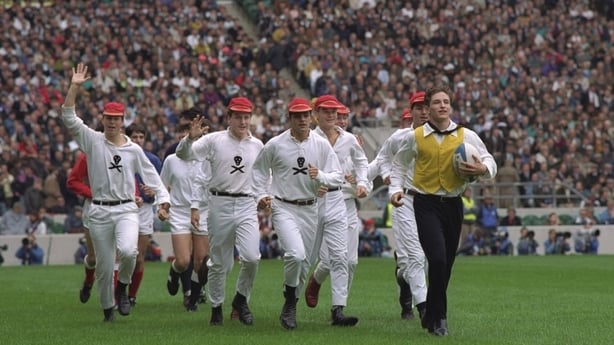
The Hosts
After getting the notion of a global tournament over the line in 1985, it had been decided then that the second iteration would be held in the north by England, Ireland, Scotland, Wales and France.
Twickenham, Lansdowne Road, Murrayfield and Cardiff Arms Park were the principle venues for Ireland and the British teams, while Le Bleus traversed France in their pool and played their quarter-final in Parc des Princes in Paris.
Ravenhill in Belfast was also used, hosting Japan against Zimbabwe in Ireland's pool.
Over 1,000,000 attended the tournament and the final was played in Twickenham in front of 56,208 fans.
Irish referees Owen Doyle and Stephen Hilditch were among the match officials.
The Pools
Pool 1: England, New Zealand, Italy, USA
Pool 2: Ireland, Scotland, Japan, Zimbabwe
Pool 3: Australia, Western Samoa, Wales, Argentina
Pool 4: France, Canada, Romania, Fiji
Ireland
Having finished second last in the Five Nations table, with a draw against Wales saving the team from a wooden spoon, Ireland's two Test losses in a July tour to Namibia only served to lower expectations further ahead of the World Cup.
Coach Ciaran Fitzgerald had also lost out-half Brian Smith after the Five Nations with the Australia ntive heading for home with no notice served to take up a rugby league contract.
That did, however, pave the way for Ralph Keyes to step in and the Cork man ended up as the tournament’s top scorer.
A year after Italia 90, there was no way the tournament was going to have a similar impact on the nation but it did give a glimpse of the direction the game was headed four years before the advent of professionalism.
Ireland squad: Terry Kingston, Steve Smith, Jack Clarke, Gary Halpin, Nick Popplewell, Des Fitzgerald, Donal Lenihan, Mick Galwey, Neil Francis, Phillip Matthews (capt), Brian Robinson, Gordon Hamilton, Noel Mannion; Fergus Aherne, Rob Saunders, Ralph Keyes, Vince Cunningham, David Curtis, Brendan Mullin, Pat O'Hara, Keith Crossan, Simon Geoghegan, Kenny Murphy, Jim Staples.
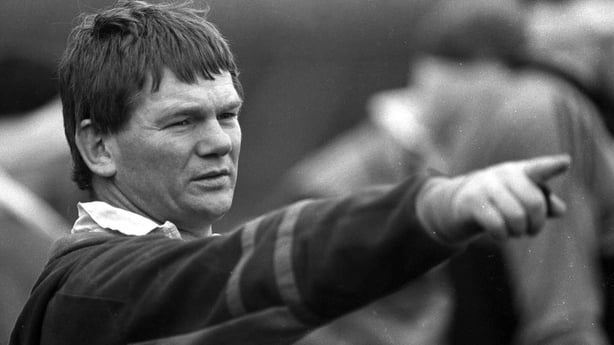
Results
Pool 2: Ireland 55-11 Zimbabwe (6 October - Lansdowne Road, Dublin)
Pool 2: Ireland32-16 Japan (9 October - Lansdowne Road, Dublin)
Pool 2: Scotland 34-15 Ireland (12 October - Murrayfield, Edinburgh)
QF: Ireland 18-19 Australia (20 October - Lansdowne Road, Dublin)
The 1991 World Cup is a case of what might have been with the heartbreak of a late quarter-final loss to Australia still smarting for many Irish rugby fans.
A five-minute period of madness, when Ireland took a surprise lead with a Gordon Hamilton try only to be pegged back by a late score in the corner by Michael Lynagh, is a Reeling in the Years staple.
The game still stands as the closest the team has got to a semi-final.
"Our defence wasn’t very clever in those days," recalled Hamilton in an interview with RTÉ Sport in 2019.
"A good schoolboy team would probably do better than we did [for the Lynagh try]."
To get to that quarter-final against the Wallabies, Ireland had finished second behind Scotland in Pool 2.
Brian Robinson scored four tries in a 55-11 win over Zimbabwe to kick off Ireland’s campaign and that was followed up by a 32-16 win over Japan.
Scotland’s victories over the same sides set up a decider in Murrayfield and while the hosts ran out 24-15 winners, the performance in defeat gave Ireland belief.
"We were on top against Scotland for a large part of it and those wins were important for momentum and we did quite well against Scotland," said Hamilton.
"The fact that we’d been on tour and together here for four or five weeks, there was a good buzz around the place and I can’t remember fretting too much about Australia being full of stars."
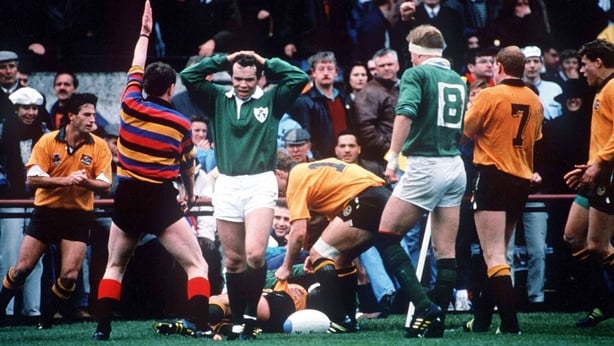
After the try, Ireland led for three minutes and 36 seconds but it was the Aussies who progressed to a semi-final with holders New Zealand in Dublin.
Having topped their pool and beaten Canada in their quarter-final, the All Blacks had no answer to the magic of David Campese, who scored one try and set up Tim Horan for the killer score.
It was New Zealand's first ever World Cup loss in ten games.
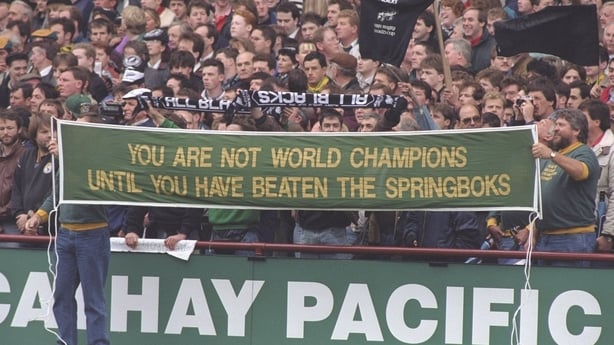
England, after an opening-game defeat to the All Blacks, had worked their way through to a quarter-final and, with the likes of Rob Andrew, Jeremy Guscott, Will Carling and Rory Underwood in fine form, beat France 19-10 in Parc des Princes.
That set up a semi-final with Scotland in Edinburgh and with the game tied at 6-6 Gavin Hastings missed a gimme in front of the posts.
"If I could change one thing in my career, it would be putting that kick over," he later told the BBC.
Soon after Andrew dropped a goal and it was England, Grand Slam winners that spring, who qualified for the final.
Under coach Geoff Cooke, England had been beaten in a summer Test 40-15 by the Aussies in Sydney, but the final was to be a much closer affair.
Having played a forward-dominated game up to that point, the hosts decided that a change-up to a more expansion approach might spook the Wallabies.
It didn't work and captain Nick Farr-Jones, with Lynagh, Campese, Horan and Jason Little, along with forwards John Eales and Viliami Ofahengaue won the day.
Lynagh put the visitors ahead with a penalty in the 27th minute and the only try of the game came from a lineout move with prop Ewen McKenzie powering over. Worth just four points back then, Lynagh converted to give Australia a 9-0 lead at the break.
Jonathan Webb kicked a penalty in the second half but that was cancelled out by a another Lynagh three-pointer.
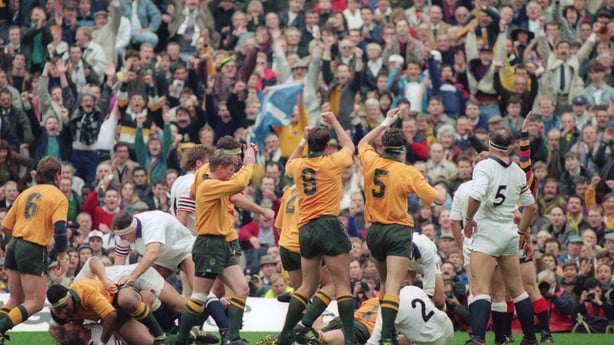
England pushed hard and were denied an almost certain try when Campese deliberately knocked on the ball in a successful attempt to stop it reach the flying Rory Underwood.
In today’s game, it would have been a certain yellow card and a possible penalty try. Webb kicked the resulting penalty but Australia, with coach Bob Dwyer in charge, held out to claim the trophy for the first time.
After the 'feet-finding’ first World Cup four years previous, the success of the 1991 version set the template for tournaments to come, with one added ingredient: the Springboks.
Top points scorers:
Ralph Keyes (Ireland): 68 points
Michael Lynagh (Australia): 66 points
Gavin Hastings (Scotland): 61 points
Top try scorers:
David Campese (Australia), Jean-Baptiste-Lafond (France): 6 tries
Brian Robinson (Ireland), Iwan Tukalo (Scotland), Rory Underwood (England), Tim Horan (Australia): 4 tries


